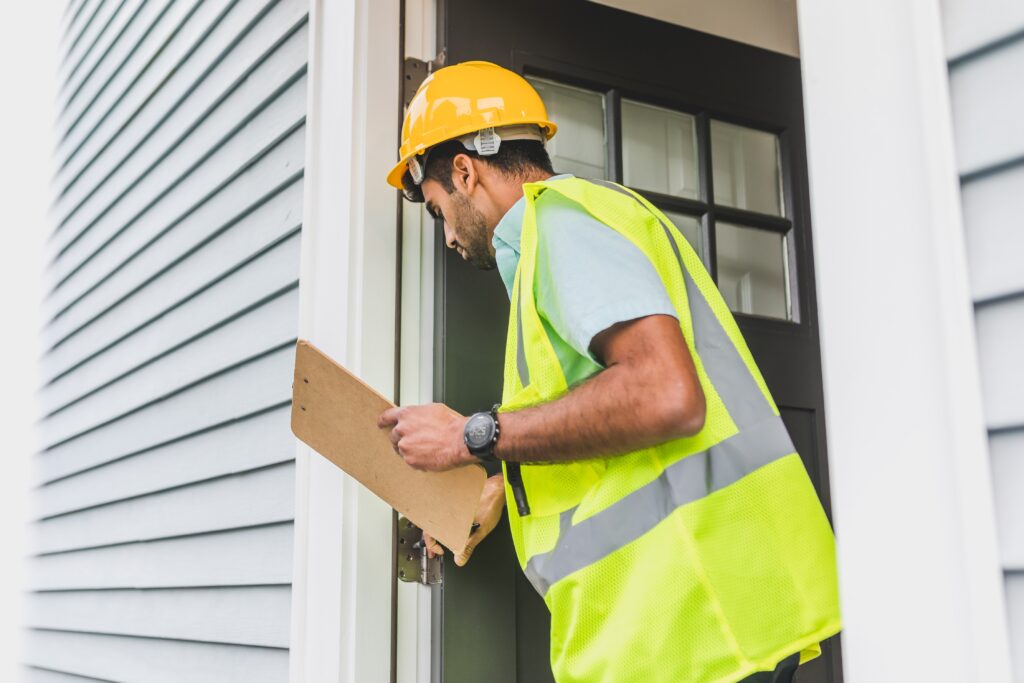Buying a home is probably the largest outlay you’ll ever make. And so it makes sense that you want to know exactly what you’re getting into, especially when it comes to additional expenses like a house surveyor. It just so happens that we’ve put this guide together looking at how much a house surveyor costs and what you can expect from the service.
What is a housing survey?
A house survey is an important step in the home-buying process. It’s a detailed inspection of a property’s condition, a comprehensive check that uncovers any hidden issues if you like. Everything from structural problems to minor repairs are covered so you get a clear picture of what you’re investing in.
There are three main types of house surveys, each offering a different level of detail.
Condition report
The simplest is the condition report, which is a basic ‘traffic light’ survey that provides a general overview of the property’s condition. It also highlights any significant issues but without going into much detail. This type of report is most suitable for newer properties or homes that appear to be in good condition.
HomeBuyer report
The HomeBuyer report is more detailed. It assesses the property’s condition but also provides advice on repairs and maintenance. It’s a good choice for anyone buying properties that are in reasonable condition but perhaps slightly older.
Building survey
The most comprehensive option is the building survey. It provides a comprehensive, in-depth analysis of the home’s condition. This typically includes the structure, materials used and any defects. A building survey is particularly useful for older properties of non-standard construction or homes where you’re considering major works.
The type of survey you’ll need largely comes down to several factors, such as the property’s age, its apparent condition and how much detail you want in the report. It’s a central part of the home-buying process and helps buyers avoid any nasty surprises after moving in.
Which factors influence the cost of a house survey?
There are several factors that go into the cost of a house survey, including the type of report you commission. Before digging into the price, let’s take a look at some of the aspects that may have an impact on your house surveyor report cost.
Size and type of property
One of the primary considerations affecting the cost of a house survey is the size of your property. Larger properties require more time to survey, which can increase the cost. Similarly, the type of property will likely impact the price. For instance, a survey of an apartment will usually be less expensive than a survey of a detached house due to the difference in complexity.
Location of the property
In areas where property prices are higher, such as London, survey costs can also be more expensive. This is often because the cost of living and operating a business in these areas is higher, which is reflected in the surveyor’s fees.
Type of survey chosen
A basic condition report will be less expensive than a more comprehensive HomeBuyer report or building survey. The level of detail and time required for each type of survey varies, which is reflected in the cost.
Experience and qualifications of the surveyor
The surveyor’s experience and qualifications play a major role in the cost. A more experienced surveyor may charge more for their services, but they also provide a more detailed and accurate report. Before deciding, balance cost considerations with the quality of the survey, as a cheaper survey may end up costing more in the long run if it fails to identify issues with the property.
What’s the average cost of a housing surveyor?
The landscape of house survey costs in the UK is quite varied. For a basic condition report, which provides an overview of the property’s condition and highlights any significant issues that need immediate attention, you’re looking at a starting price of around £250. This is the most basic type of survey and is suitable for new builds or relatively modern properties.
On the other end of the spectrum, a comprehensive building survey, which provides a detailed analysis of the property’s condition, including structural problems, potential repairs and maintenance advice, can cost upwards of £650. This survey is particularly recommended for older properties, or those with visible structural issues.
It’s important to remember, however, that these are merely average values. The actual cost can vary significantly depending on a range of factors, including the surveyor’s experience.
How to choose a house surveyor
Choosing the right house surveyor is a central step in the home-buying process. Their findings will significantly influence your decision to buy a property, negotiate its price or even walk away from the deal. So it’s essential to find a professional you can trust. Here’s what you should look out for when choosing a surveyor.
Check registration and qualifications
Make sure the surveyor is registered with a recognised governing body, such as the Royal Institution of Chartered Surveyors (RICS). Registration with such an institution guarantees that the surveyor adheres to certain professional standards and is qualified to carry out the survey. It also provides a level of protection, as these organisations often have procedures in place to handle complaints and disputes.
Experience and specialisation
Consider the surveyor’s experience and area of specialisation. If you’re buying a period property or a house with a unique construction, it might be beneficial hiring a surveyor who specialises in these types of property. Their knowledge could provide more insight into potential issues or maintenance requirements.
Get multiple quotes
Don’t be afraid to shop around. Get quotes from several surveyors to compare costs. Don’t base your decision on cost alone, however. The cheapest quote may not provide the best service or most thorough survey, so consider the surveyor’s reputation, reviews from previous clients and your personal comfort with them.
How to save on house survey costs
While a house survey is undeniably an integral part of buying a home, there are ways to manage and potentially reduce these costs. Just remember, that while saving money upfront can be appealing, a comprehensive survey can prevent costly surprises down the line.
Negotiating the price
One approach to potentially reduce costs is to negotiate the price with the surveyor. Some surveyors may be willing to discuss their fees, especially if you’re considering multiple services or if their initial quote is significantly higher than others you’ve received.
Choosing an appropriate survey
Another way to save is by choosing the right type of survey for your property. If the property is relatively new and appears to be in good condition, a less detailed (and less expensive) survey, like a condition report, might be sufficient. However, this should be balanced with the risk of missing significant issues that a more detailed survey could uncover.
Shop around
Don’t hesitate to shop around and get quotes from different surveyors. Prices can vary significantly, and you might find a more competitive rate by doing some research.
Consider the long-term value
While it’s natural to seek ways to save, remember that skimping on a survey could end up costing more in the long run. If a less detailed survey fails to identify significant issues with the property, you could be left with hefty repair bills down the line. Therefore, it’s essential to consider the long-term value of a thorough survey, not just the upfront cost.
Summary: the importance of a housing surveyor
While the cost of a house survey can seem like a significant expense, it’s a central part of buying a home and will give you more confidence. It helps to avoid costly surprises down the line, giving you peace of mind about your investment. So, when you’re budgeting for your new home, don’t forget to factor in the cost of a house survey.







